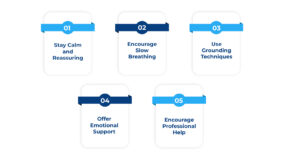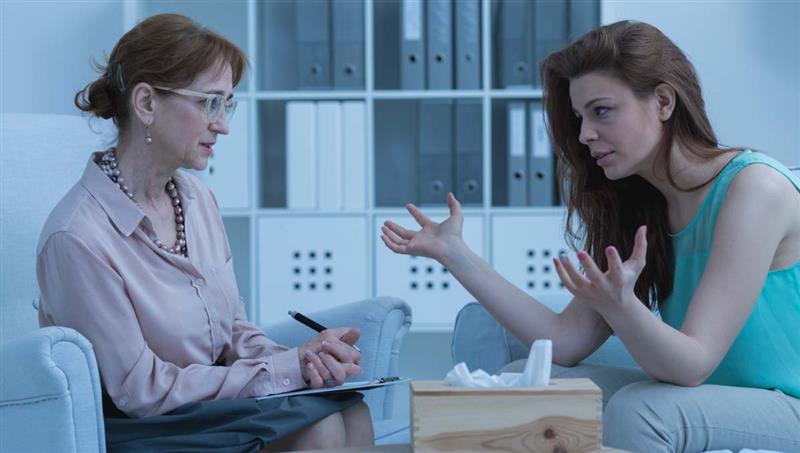Panic disorder is a psychological disorder that is characterized by moments of sudden and intense fear accompanied by physical signs such as rapid heartbeat, loss of breath, and dizziness. Similarly, panic disorder treatment involves the mitigation of the regularity and intensity of these attacks and helps individuals back in control of everyday living.
Meanwhile, medication is one of the verified plans, as it can equalize chemicals in the brain, relieve nervousness, and avoid frequent panic attacks. The combination of medication management and healthy coping mechanisms gives long-term relief. Most individuals receive a major benefit and improvement in their living conditions with the right treatment from a mental health professional. Stay with us and read the article till the end, and get more interesting information!
What Is Panic Disorder?
Panic disorder is a panic condition in which one can experience the same disorder on a recurrent and unknown basis. A panic attack may instill severe fear or unfamiliar embarrassment. Therefore, dealing with a panic attack, people can also be additionally covered with physical symptoms, e.g., an high heartbeat, sweating, tremor, inability to breathe freely, or fainting. There is a possibility of the attacks happening at random times, and the individual might feel that something dreadful is about to happen even though there is no real danger.
Moreover, people with panic disorder may develop fears concerning whether they may experience another attack, and this may lead to avoidance of certain places or situations. This can disrupt their day-to-day activities, whether at work or relationships. Thus, the good aspect of it is that panic disorder is one of the disorders that could be cured through therapy or medicine, and which enables individuals to manage the symptoms and lead a normal life.
Panic Disorder Symptoms
Here are the symptoms of panic disorder:
- Fast, or galloping pulse
- Sweating or shivering
- Shaking or trembling
- Pain or tightness of the chest
- Stomach upset, nausea
- The numbness or tingling feelings
- Phobia of loss of control or going crazy
Woman’s Panic Attack Symptoms
Below are some women’s panic attack symptoms:
- Tightness or angina in the chest
- Sweating, frequently clammy hands
- Tympanic, rumbling
- Temperatures, chills, or flushes
- Nausea or stomach pain
- Worry about loss of control or “going crazy’
- Feeling of impending doom or death
What Causes a Panic Attack?
The panic attack can take place if the body suffers the fight-or-flight response despite not being under any threat. Some of the causes include:
- Generalized anxiety or panic disorder (GAD)
- The resentful childhood memories reappear in an emergency state
- Phobias (e.g., flight phobia, crowd phobia, or claustrophobia)
- Substance use or withdrawal (caffeine, alcohol, or medicines)
- Alteration in brain chemistry (neurotransmitters, e.g., serotonin)
- Family factors and family history of panic attacks or anxiety
- An overbalance in pregnancy hormones, menopause, or PMS
- Chronic diseases, chronic conditions raise the strain on the body
How to Help Someone with Panic Disorder?

1. Stay Calm and Reassuring
When a person is in a panic state, their presence might be reassuring to them. Talk calmly, speak in a moderate tone, and do not panic. Make them understand that they are not under threat and the attack will pass. Therefore, do not ignore their feelings or instruct them to relax. Your consistent support can go a long way in assisting them to gain control.
2 . Encourage Slow Breathing
Symptoms of panic include rapid breathing that leaves a person vulnerable to panic. Have them make slow, deep breathing in through the nose and breathing out through the mouth. Breathing exercise eliminates nervous system and lowers the occurrence of dizziness or tightness of chest tightness. You can even breathe along with them to maintain a rhythm.
3 . Use Grounding Techniques
Grounding serves to take the attention off the panic and focus back on what is in the present. You can advise to stamp five things they see, four things they can feel, three things they hear, two things they smell, and one thing they taste. This kind of sense work serves to divert the mind from fear. So, a sense of stability can also be obtained through physical grounding systems, such as touching a cool item or getting the feel of their feet on the ground.
4- Offer Emotional Support
Be supportive and emit empathy when listening without judging them, and acknowledge their experience. When they feel ready, let them speak out about their fears. Do not impart anxieties on them by thrusting them with situations provoking anxiety unless they are ready. Regular emotional assistance can make them feel less isolated about coping with this condition.
5. Encourage Professional Help
Panic disorder can be treated considerably with medication or therapy, or a combination of the two. Advise them to visit a mental health expert, including a mental therapist who uses medication or psychotherapy. Offer to accompany them to appointments or find resources. The interventions made in the initial stages of panic disorder treatment minimize the occurrence and severity of attacks and, thereafter, the overall quality of life.
How to Stop Panic Attacks?
Once you even understand that you are having a panic attack, you must attempt to concentrate on slow and deep breaths. Count the four seconds, breathe in with the nose, hold the breath, and breathe out with the mouth, counting to six. This will aid in relaxing you and normalize the quick beatings of the heart. The next skill that you can learn to use is grounding, or giving attention to what a fellow human being is attempting to do, simply by pointing at objects in a room or even touching a particular object that would then remind you to go back to the present.
Additionally, yoga or meditation, or gentle walks will both ground you and your mind. Excessive use of caffeine elicit the effects of anxiety, just as the excessive use of alcohol. In case of chronic panic attacks, you have to consult a mental health specialist who will, in turn, prescribe a panic disorder treatment. However, you can learn to deal with panic attacks with the right strategies and support so that you feel comfortable even in your daily life.
How To Treat Panic Attacks?
The best treatment for panic disorder often includes a mix of therapy and healthy lifestyle changes. Things that trigger some of the behavior can be dealt with during a psychiatric assessment. Breathing exercises and relaxation reduce the symptoms of the attack. Physical activity due to exercising, sleeping, and dieting may maintain the level of anxiety at an optimum level. Hence, early intervention will help in managing and reducing panic attacks in the long term.
1. Psychiatric Evaluation
Psychiatric evaluation refers to a session with a mental health expert to know what you think, feel, and do. It contains questions regarding your mood, sleeping, eating habits, your medical history, and any past mental health issues. It is aimed at getting a clear view of what you are going through, and as such, the doctor would get an accurate diagnosis. You can also complete some questionnaires or straightforward tests to provide additional details in regards to your symptoms.
In addition, such assessment is useful in developing a tailored panic disorder treatment program responsive to your particular needs, such as therapy, medication, or lifestyle change. It is not the judgment about you, but the search for the most effective solution so that you can feel better. So, psychiatric assessment is usually the first step to the improvement of mental state and a regular existence.
2. Panic Disorder Medication
Panic disorder treatment medication can decrease the frequency of panic attacks and their severity. Health experts can prescribe the use of antidepressants, which are either SSRIs or SNRIs, and they should correct the anxiety-related chemicals occurring in the brain. Other measures would include anti-anxiety medication such as benzodiazepines that can be administered quickly, but are typically to be used short-term as they lead to dependence. Depending on your symptoms and medical history, your doctor will select the appropriate medication.
Furthermore, the healthy coping strategies that go hand in hand with medication have the best effect. Medicine does not cure panic disorder, but it may help control the symptoms. You should take it the way your doctor prescribes it and visit regularly to examine your progress. Many individuals find that their panic attacks are far more easily treated and do not cause as many issues in their everyday lives with the proper panic disorder treatment protocol.
Closing Notes- Panic Disorder Treatment
The patient treatment process for a panic disorder at MAVA Behavioral Health aims at patient treatment through medication management as well as psychiatric assessment. It all starts with a thorough psychiatric assessment that helps in comprehending the condition, in addition to the symptoms, triggers, and history of the medical condition.
According to this evaluation, our mental health professionals recommend some well-chosen medications to decrease the occurrence and severity of panic attacks. The consistent medication management helps ascertain medication dosage and the type of medicine that is effectively working without excessive side effects. Thorough evaluations and professional follow-up support, we assist patients in achieving control over panic disorder and enjoying a better life.
FAQs
What is the effective treatment of panic disorder?
At MAVA Behavioral Health, you can get the effective, prompt and hassle free treatment through mediation. It can either done by telehealth or in-clinic visits.
Is there a cure for panic disorder?
It has no guaranteed cure; however, most individuals can cope with the condition through a proper treatment plan and guidance.
What is the duration of treatment for panic disorder?
Durations of treatment differ for panic disorder. Certain individuals will improve within weeks, and others might require a few months under constant care.
Will I have to take medication to treat panic disorder?
In some cases, not all the time, people respond well to therapy without medications, whereas in other instances, the patients respond well to medicine.
Are panic disorder and anxiety the same?
No, panic disorder consists of acute panic attacks, whereas general anxiety consists of persistent feelings of worry or pressure.









